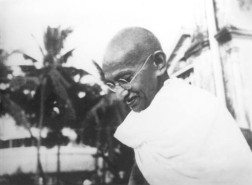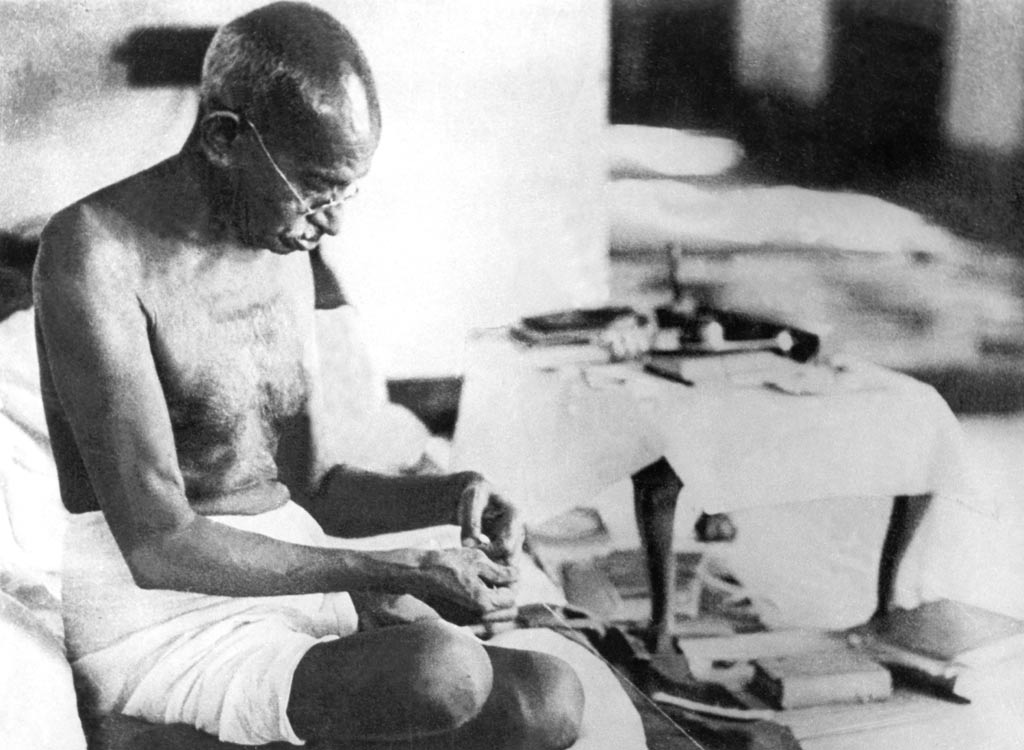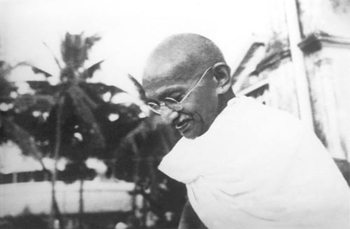Originally posted on October 2, 2013. Updated on October 1, 2019.

Reverently referred to as Mahatma Gandhi, used non-violent protest as a means to gain Indian independence in the mid 1900’s.
International Day of Non-Violence, is commemorated on the birthday of Mahatma Gandhi, October 2, celebrating his contribution to uplifting human dignity and promoting non-violent social action. Individuals like Gandhi have led movements that have transformed the global consciousness to fundamental principles and shared values that have brought humanity closer to a world of peace and prosperity.
Gandhi believed and fought for the preservation of human rights and dignities. Throughout his life, Gandhi’s search for truth would lead him to discover that, “There are innumerable definitions of God, because His manifestations are innumerable. They overwhelm me with wonder and awe and for a moment stun me. But I worship God as Truth Only.”
Dr. Moon often points to Gandhi as a “spiritual leader” who stepped out of his “religious box” to lead a movement that had significant social impact.
And indeed, his spiritual convictions were the basis for his seminal philosophy of Satyagraha (non-violence). Gandhi explains in his paper “Satyagraha in South Africa” that:
“Truth (Satya) implies love, and firmness (Agraha) engenders and therefore serve as a synonym for force. I thus began to call the Indian movement “Satyagraha”, that is to say, the Force which is born of Truth and Love or non-violence.”
Gandhi placed a simple philosophy in the hands of every person, from every cast, race and religion; the power of love and truth and personal will choose to live by universal truths and principles and shared values. In doing so, he birthed a movement that broke traditional divisions, and created monumental societal transformation that also left an indelible imprint on the rest of human history from Dr. King in the United States to Rev. Führer in East Germany.

As a form of non-violent protest against the British textile industry, Gandhi spun his own cloth and encouraged other Indians to do the same.
His principle of non-violence opened up something that could not be defined by economic of political power, something that Dr. King would later call “soul force.” It was this power that rested in the nobility of the human spirit that believed if one did not retaliate to violence, but respond with truth, service and love, one could stir the perpetrator’s conscience and soul. It was a power of unity and a larger vision that drew the “others” into a family, rather than ostracize and isolate.
Gandhi’s journey began in India, and within each stage of his life he would deepen his understanding and strengthen his values and beliefs. Each experience helped form the underpinning of his conviction that every human being possess a divine dignity, and the right to self-govern.
As a child he watched his parents stand up against injustice, even when it proved to be inconvenient. He would then study law in England, where he discovered an intrinsic value granted by God, present in every person and every religion.
He lived in South Africa where fierce prejudice would deepen his love for justice and righteousness, sparking his initial work with non-violence as a form of protest, and his conviction in the fundamental rights of all people.
Eventually he would return to India where he would begin a groundbreaking non-violent revolution to secure independence for India from the British Empire.
As a form of non-violent protest against the British textile industry, Gandhi spun his own cloth and encouraged other Indians to do the same.
These principles and beliefs in human rights and dignity are derived from a common creator and opened the way for India to become an independent nation, setting the stage for global decolonization after WWII.
But, as Gandhi humbly said at the close of his autobiography, “So long as a man does not of his own free will put himself last among his fellow creatures, there is no salvation for him.” To him, justice and happiness did not come from one best religion, or one best person, or even one best philosophy; it was grounded on the universal truth of living for others, of love. It was his humble search to embody that truth that was the heart of the awakening that he instigated.
As we celebrate his legacy, this would be the central point, to recognize the divinity and dignity of each person, and put love and truth into action for the benefit of each of them.

